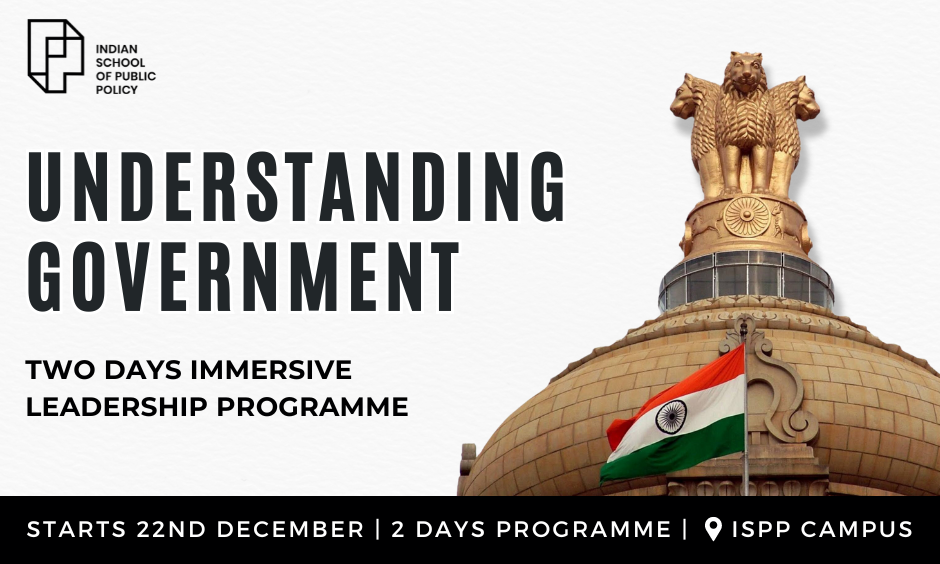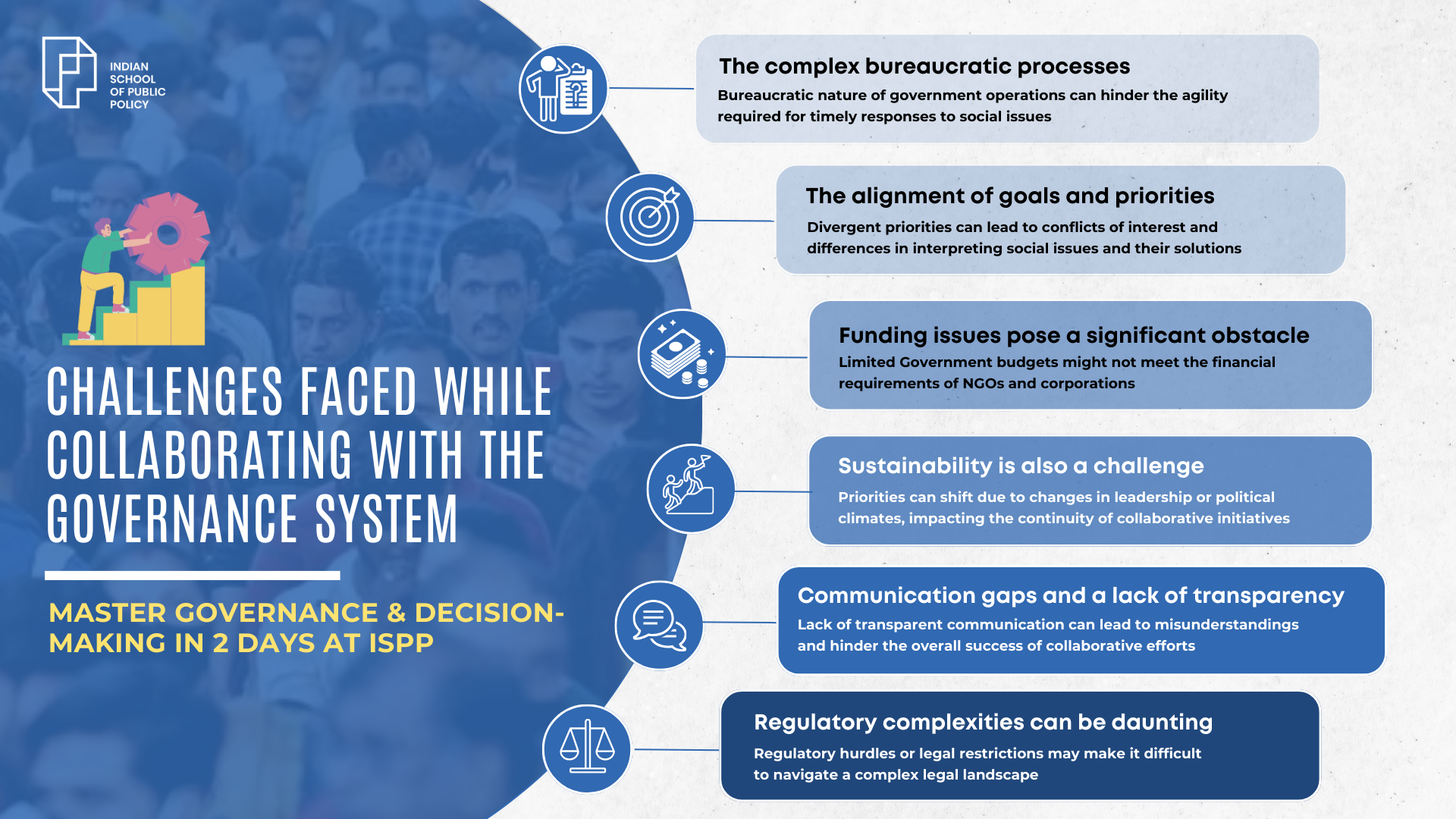
Master Governance & Decision-Making In 2 Days At ISPP

Facilitate Seamless Collaborations With The Government With ISPP!
Teamwork And Collaboration Is The Recipe For Success | And Yet The Road To Success Is A Rocky One! | Leadership Training and Development With ISPP ToThe Rescue | FAQs
______________________
“Great things are done with a series of smaller things brought together”
~ Vincent Van Gogh
The way businesses and entrepreneurs need the support of their proactive, dedicated employees to achieve success, the government relies on NGOs, corporations, and small enterprises for expertise, innovation, and efficient implementation. Collaborative efforts amplify impact, addressing diverse needs and fostering inclusive professional development crucial for societal progress that the government alone cannot achieve. It holds regulatory and policymaking powers, essential for large-scale systemic change. Companies and NGOs work with the government to contribute innovation, efficiency, and grassroots insights, enhancing the effectiveness of its initiatives. This trilateral collaboration addresses complex challenges holistically, fostering sustainable development, social welfare, and economic growth. Such partnerships align diverse strengths, creating a synergy crucial for tackling multifaceted issues and ensuring the well-being of communities on a broad scale.
And yet, the road to success is a rocky one!
Why?
Let’s understand the challenges.
Challenges Faced While Collaborating with The Governance System
Collaboration between NGOs, corporations, and companies with the government can be a powerful force for positive change, yet it comes with a set of challenges.
The complex bureaucratic processes within government structures. Government agencies often have intricate and lengthy decision-making procedures, fund allocation, and project implementation, causing delays in the initiation and execution of collaborative projects. The bureaucratic nature of government operations can hinder the agility required for timely responses to social issues.
The alignment of goals and priorities – NGOs, corporations, and companies often have specific missions, objectives, and values that may not perfectly align with government policies or political agendas. Divergent priorities can lead to conflicts of interest and differences in the interpretation of social issues and their solutions.
Funding issues pose a significant obstacle – Government budgets may be limited, and funds allocated for collaborative projects might not meet the financial requirements of NGOs and corporations. This can result in insufficient resources to address social challenges effectively.
Sustainability is also a challenge – Government priorities can shift due to changes in leadership or political climates, impacting the continuity of collaborative initiatives. This uncertainty can make it challenging for NGOs and corporations to plan and execute long-term projects with confidence.
Communication gaps and a lack of transparency can impede effective collaboration. Governments might not always communicate their expectations clearly, and NGOs and corporations may struggle to convey their needs and concerns. This lack of transparent communication can lead to misunderstandings and hinder the overall success of collaborative efforts.
Regulatory complexities can be daunting – NGOs and corporations may encounter regulatory hurdles or face legal restrictions when working with the government, making it essential to navigate a complex legal landscape.
Despite these challenges, successful collaborations can occur when all parties engage in open communication, foster a mutual understanding of goals, and work collectively to address the intricacies of social issues. Policy-makers who are adept in governance and decision-making strategies play a pivotal role in facilitating smooth collaborations between companies, NGOs, and the government. Their expertise ensures effective communication, streamlined processes, and policy frameworks that address challenges, fostering successful partnerships for impactful socio-economic development.
Interesting right? You can also
Master Governance & Decision-Making with This 2-Day Immersive Leadership Programme
Understanding the structure of Government requires a 2-Day Immersive Leadership training and development programme designed by ISPP to address critical challenges that are often faced while collaborating with the government. This course delves into governance and decision-making strategies for leaders aspiring to achieve organisational success, employing practical examples for enhanced understanding.
Highlights
- Two days of in-person sessions at ISPP Campus
- Four sessions per day; Two in the morning and two in the afternoon
- Morning sessions: Interactive lectures + Case Studies and Afternoon Sessions: Games + Group Exercises
Who should attend this programme?
- Public Policy/Government Affairs division of Large size Corporates
- Heads of NGOs & Think Tanks
- Representatives from Associations from Civil Societies
- Business Unit Heads of Small size Corporates
- Heads of Academic Institutions
- Representatives from Industry Associations
But are two days enough to understand the complex structure of government? Well, let’s take a look at them.
Curriculum
During this two-day leadership training and development programme, we will delve into four courses. It commences with an introduction to Indian public policy-making and extends to cover diverse aspects including governance, policy-making, and establishing effective partnerships with the government.
Public Policy in India
This course introduces participants to the structure and frameworks of public policy, examining the stages an issue undergoes before becoming an official government policy. It empowers leaders to engage with governments for positive change.
Governance in India
Unravelling the intricacies of the Indian governance system, this course explores the three-tier governance system, law-making authority distribution, administrative structures, and decision-making processes. Leaders gain insights to engage effectively with governance spheres.
Economic Policy-making in India
Demystifying economic policies and government decision-making, this course covers Public Sector Undertakings, collaboration examples between industry and civil society, and insights into government investment decision-making strategies. Participants gain knowledge to engage in economic decision-making processes.
Government-Industry Partnerships
Essential for a growing Indian economy, this course equips industry leaders to build effective partnerships with the government. It introduces tools to identify relevant officials for policy issues and communication channels for building partnerships driving innovation and progress.
Take a look at the curriculum committee here.
Register your Interest to Study at ISPP
FAQs
Why is collaboration crucial between businesses, NGOs, and the government?
Collaboration amplifies impact, addressing diverse needs for societal progress. The government holds regulatory and policymaking powers essential for large-scale systemic change.
What challenges are faced in collaborations with the government?
Challenges include bureaucratic processes causing delays, misalignment of goals, funding issues, sustainability concerns, communication gaps, and regulatory complexities
Who should attend the 2-day leadership programme at ISPP?
Professionals from the Public Policy/Government Affairs division of large corporations, Heads of NGOs and think Tanks, Representatives from Civil Society Associations, Business Unit Heads of small corporations, Heads of Academic Institutions, and Representatives from Industry Associations.
What modules are covered in the 2-day workshop?
- The workshop covers four courses:
- Public Policy in India
- Governance in India
- Economic Policy-making in India
- Government-Industry Partnerships
What is the programme schedule?
Two days of in-person sessions at ISPP Campus with four sessions per day—two in the morning (Interactive lectures + Case Studies) and two in the afternoon (Games + Group Exercises).
What are the other programmes offered by ISPP?
Besides the 2-day leadership programme, ISPP has 2 other programmes –
Lokneeti – 4-Months Certificate Programme in Policy, Data & Behaviour Change for working professionals interested in participating in public policy.
PDM – ISPP’s flagship programme in Policy, Data Management and Design for citizens interested in making an impact in the public policy sphere
Who is the programme faculty?
As the leading institution in the realm of public policy education, ISPP draws top-tier talent within the field. Its faculty, representing a spectrum of disciplines including economics, law, governance, development studies, and public policy, consists of distinguished individuals. The committed faculty at ISPP endeavors to mold the trajectory of public policy in India through their wealth of knowledge, extensive experience, and specialized expertise.
How do divergent priorities impact collaborations?
NGOs, corporations, and companies may have missions that don’t perfectly align with government policies, leading to conflicts of interest and differences in interpreting social issues.
How can regulatory complexities be navigated in collaborations?
NGOs and corporations may encounter legal hurdles, making it crucial to navigate a complex legal landscape when working with the government.
What role do policy-makers play in facilitating collaborations?
Policy-makers adept in governance and decision-making ensure effective communication, streamlined processes, and policy frameworks, fostering successful partnerships for impactful socio-economic development.
Infographics



